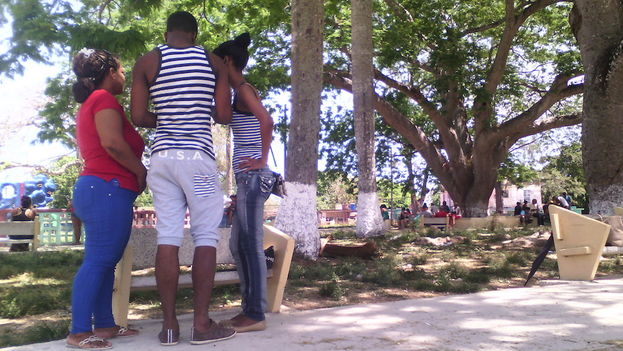
14ymedio, Yosmany Mayeta Labrada, Havana, 30 April 2016 – Like an arbitrary lottery, Havanans dream of having a WiFi zone installed near their homes. These outdoor places to connect raise the price per square foot of real estate in the immediate vicinity and help local businesses flourish. Speculations about where the new wireless antennas will be placed absorb everyone’s interest.
The local division of the Cuban Telecommunications Company SA (ETECSA) told local media on Thursday that they are currently working in different districts in the capital to open ten new public WiFi areas, in a first step to meet the commitments for this year.
Engineer Iris M. Duran Fonseca, a specialist in ETECSA’s Marketing, Communication and Business Management Support division, said the new service will benefit the municipalities of Plaza de la Revolucion, La Lisa, Centro Habana, Habana del Este, Arroyo Naranjo, Boyeros and 10 de Octubre.
Arroyo Naranjo currently has one of these areas in Santa Amalia Park, where hundreds of people connect to the internet daily to communicate through social networks or by Imo, an application that lets you chat in real time with family abroad.
Alejandro, a young student in high school, told 14ymedio the advantages offered by this connectivity, despite the high price, which is 2.25 CUC (about $2.25 US) per hour of navigation. “I come every day,” he claimed, since he discovered that he could connect near his house. “Always in the evenings, because I go to school in the mornings and then I communicate with la pura (his mother) who lives in Spain,” he said.
The Mantilla Council in Arroyo Naranjo has been one of the outlying areas visited by ETECSA’s WiFi implementation specialists. El Parque de la Leche, on Caballero Street, between Pizarro and Ponce de Leon, is where the new technology will be installed. To that end, the park is in the first phase of a total refurbishment.
Yolanda, a retired teacher and resident of the area, says that since they put the first WiFi antennas in the capital she has been able to communicate with her son who lives in the United States. “Now with this Samsung phone he sent me I can see and talk to him; he left in 1994 and since then has not come over to the island,” she explains.
Neighbors near the park highlighted the need to rescue this completely abandoned place. “This may be a better option,” said Sergio Mendez, who feels happy because the “area is coming alive.”
“They will have to light the place well and also fix the access roads, because they are in poor condition,” insisted Elena, an executive member of the Committees for the Defense of the Revolution (CDR).
The custodian of Mantilla park criticized the instability of the builders in this first phase. “They come one day then don’t come the next, and so the work scheduled to be completed later this year will never be completed. If they aren’t consistent in their work, the effort will be in vain,” he said.
Food vendors see the WiFi zone as a chance to improve their businesses. “There will be more people here, so soft drinks, food and the navigation cards will be in greater demand,” said Rosi, who sells sandwiches and milkshakes a few yards from the park.
The ETECSA communication specialist said it was necessary to “evaluate a set of elements according to the Board of Management of each territory and other agencies such as the National Police, the Electric Basic Organization and local representatives of Communal Services.” However, she said that neighboring towns have been included, some rural, in order to improve the communication services of their residents.
A director of the Arroyo Naranjo Council of the Municipal Administration told this newspaper that Mantilla Park was selected because it was located in a marginal area and has considered very dangerous. “Now we have to take steps to eliminate crime a little, lighting the area, putting surveillance cameras and constant control of the police in the area, which will reduce the tragic reports quite a bit,” he said.
So far, in Havana there are 17 public WiFi areas already equipped with lighting and with improved amenities. In early February, the newspaper Granma reported that the capital will have 30 new WiFi areas this year, two more for each municipality.
ETECSA also announced that in the coming months it will enable connectivity in at least three parks for each province and in other sites with a large influx of people, such as recreational and cultural centers. However, managers clarify that it will be done when the conditions exist to install the necessary technology and when they can guarantee both the comfort and security of Internet users.
